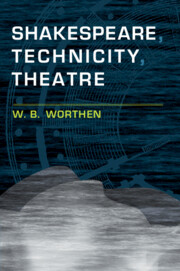Book contents
- Shakespeare, Technicity, Theatre
- Shakespeare, Technicity, Theatre
- Copyright page
- Contents
- Illustrations
- Acknowledgments
- Chapter 1 Introduction: Theatre, Medium, Technology
- Chapter 2 The Face, the Mask, the Screen: Acting and the Technologies of the Other
- Chapter 3 Shax the App
- Chapter 4 Interactive Remediation: Original Practices
- Chapter 5 Designing the Spectator
- Chapter 6 And Or And Not: Recoding Theatre
- Notes
- Works Cited
- Index
Chapter 6 - And Or And Not: Recoding Theatre
Published online by Cambridge University Press: 22 May 2020
- Shakespeare, Technicity, Theatre
- Shakespeare, Technicity, Theatre
- Copyright page
- Contents
- Illustrations
- Acknowledgments
- Chapter 1 Introduction: Theatre, Medium, Technology
- Chapter 2 The Face, the Mask, the Screen: Acting and the Technologies of the Other
- Chapter 3 Shax the App
- Chapter 4 Interactive Remediation: Original Practices
- Chapter 5 Designing the Spectator
- Chapter 6 And Or And Not: Recoding Theatre
- Notes
- Works Cited
- Index
Summary
Theatre both illustrates and instantiates the supplemental logic of technicity, perhaps not least insofar as its “inside-out model of human subjectivity confers an uncanny aura on those technical objects onto which our subjectivity has been displaced” (Greaney, “Suspended Animation” 349–50). The agential functioning of stage objects has long been recognized as a principle of theatre, as has its flip side, the anxiety that the humanity of actors is reciprocally hollowed out, undone in the process of their technologization for theatrical performance. In this sense, the fantasy of actorless performance also reciprocates the modern industrialization of the theatre, recalling Stiegler’s sense that the “human’s relation to the technical object” has profoundly changed, or is feared to have changed, at least to the extent that “machines” become “the tool bearers, and the human is no longer a technical individual” (Technics 1: 23).1 Rather than seeing this impulse, running from Edward Gordon Craig’s Übermarionette through the Futurists to Beckett’s Play and Not I, as eccentric, we should understand it as a dimension of the technicity of modern theatre, its ongoing calibration of the human instrument at the intersection of its external technologies of representation. As Beckett’s notorious remark – “The best possible play is one in which there are no actors, only the text” – implies, that tension is particularly evident at the interface between acting and writing, long a troubled juncture in the thematics of Western theatrical technicity. In Ben Jonson’s masques for the Stuart court, speaking the dialogue characterized the performance of the hireling actors, servants working alongside (but socially and even ontologically subordinate to) the aristocrats iconically demonstrating their humanity by not speaking, by not acting the poet’s script, their status embodied not through the articulation of the numbers of spoken verse but in their elegant assimilation of and to the numbers of courtly dance. When William Prynne castigated actors as “whores” in his Histrio-Mastix, it was taken as a reference to the Queen Henrietta Maria and her ladies, who took speaking parts in Walter Montagu’s The Shepherds’ Paradise in 1633. The offense cost him his ears, but not without also illustrating the potentially injurious consequences for aristocratic performers of speaking a script, rather than merely showing themselves in brilliant and revealing costumes, moving to the sublime geometry of the dance, magically appearing from evocatively transformative scenic machines.2
- Type
- Chapter
- Information
- Shakespeare, Technicity, Theatre , pp. 176 - 203Publisher: Cambridge University PressPrint publication year: 2020



